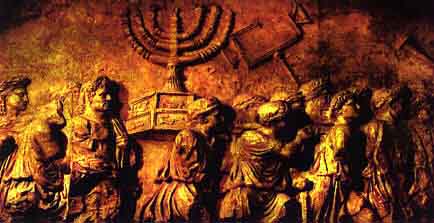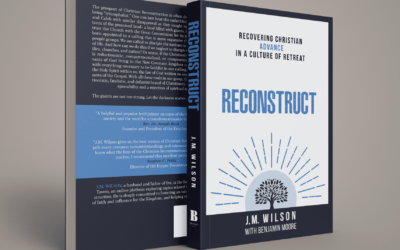Every year at Christmas many Christians sing a particular carol that has a theology long lost to the cultural pessimism of the twentieth century. Isaac Watt’s Joy to The World has a message of a hope that many Christians don’t even realize is there. Consider the third stanza,
No more let sins and sorrows grow, Nor thorns infest the ground; He comes to make his blessings flow, Far as the curse is found, Far as the curse is found, Far as, far as, the curse is found.
This is how the Kingdom of God is described from a Postmillennial perspective. Christ is currently reigning from his throne and is in the process of constructing his Kingdom to completion (Heb. 10:12-13), after which he will return to earth to deliver his Kingdom to God the father after destroying every rule and every authority and power (1 Cor. 15:24). Yes, this means the world will get better before Christ’s second coming, and yes, I am one of those weirdos who believe it.
This was the hope of many theological giants throughout church history such as: John Owen, William Perkins, Samuel Rutherford, Jonathan Edwards, John Cotton, George Whitefield, Augustus H. Strong, Benjamin B. Warfield, Charles Hodge, A. A. Hodge, C. W. Hodge, Greg Bahnsen, Gary North, and Kenneth Gentry. Unfortunately, this hope was lost due to the hardships of the two world-wars of the twentieth century.
I’ve had several people ask me, “How can you believe a world this wicked could possibly get better?” To which I answer, “Because I myself was lost in my own unrighteousness and Christ came and made me a new creation, and if he can make a wretched like myself rise from spiritual deadness, then he can certainly do it for the rest of the world.”
Postmillennialism (PM) is simply the belief that Jesus’ commission to make disciples of all nations will be a smashing success. As a result, the gospel will have an incredible influence on all areas of society, such as: economics, politics, government, education, and culture. The Church will succeed because Christ will be victorious within human history.
What is Postmillennialism?
The major eschatological views are defined by the chronological order they place two major events – the thousand year reign of Christ spoken of in Rev 20:1-6 and his second advent. Once these two events are placed in a certain order, an eschatology is born. PM is the eschatological school of thought that believes Christ will return after (post) his thousand year (millennial) reign. This view is opposed to Premillennialism which states that Christ will return before his thousand year reign and Amillennialism which believes exclusively in a spiritual kingdom.
The millennium according to PM is not a literal thousand years, but rather a symbolic thousand years indicating a long period of time. The Bible often uses the number “one-thousand” to represent a generally large quantity. For example we hear the psalmist say when speaking for God, “For every beast of the forest is mine, the cattle on a thousand hills” (Psalm 50:10). This is not to say God owns cattle on strictly one-thousand hills and not a single hill more. Another example is Deuteronomy 7:9 – “Know therefore that the LORD your God is God, the faithful God who keeps covenant and steadfast love with those who love him and keep commandments, to a thousand generations.”
God doesn’t restrict keeping his covenant and steadfast love to only a thousand generations; rather the verse uses “a thousand” to indicate that God keeps his covenant and steadfast love to many generations who love God and keep his commandments. This is the same way Revelation 20:1-6 uses the number “one-thousand” when describing the kingdom. Christ brought the kingdom and after his ascension he sat down at the right hand of God to reign until his enemies are defeated. Satan was bound at the beginning of the millennium (at the cross) so he would not be able to deceive the nations any longer. During the inter-advental period Christ will expand his kingdom throughout the entire world. After mankind has experienced a worldwide conversion and Christ’s enemies are defeated the millennium will end, then Satan will be loosed from his prison for a short while to deceive the nations once again. The last event will be Christ’s return when he delivers up the kingdom to God. These are the basic tenants of PM.
The plan of the kingdom
Christ planned for his church to participate and succeed in expanding his kingdom. In Matthew 28:18-20, commonly known as the Great Commission, Jesus tells his disciples,
All authority in heaven and on earth has been given to me. Go therefore and make disciples of all nations, baptizing them in the name of the Father and of the Son and of the Holy Spirit, teaching them to observe all that I have commanded you. And behold, I am with you always, to the end of the age.
Let’s think through this passage. First, Jesus had been given all authority in heaven and on earth. He was not awaiting the establishment of his royal office, but was already given the authority to reign over the earth by that time. Next, Jesus says, “Go therefore” (i.e., in conclusion to what I just said) “make disciples of all nations.” Some who oppose PM say Christ has been given authority over the nations but does not exercise it in order to bring a world-wide conversion. But how much of the nations does Jesus want? The Psalmist says, “Ask of me [God], and I will make the nations your [Christ’s] heritage, and the ends of the earth your possession” (Psalm 2:8). Dr. Greg Bahnsen raised an interesting question about this verse. He asked, “did the Son forget to ask the Father for the nations?” (Bahnsen, 1999). Jesus does not want only a few citizens from each nation but all of the nations; and God has promised to give them to Jesus as his heritage and possession.
Finally, Jesus’ encouragement for the disciples to carry out the Great Commission was that he would be “with you always, to the end of the age.” Jesus gave this encouragement so Christians would rest assure in the ultimate success of the spread of the gospel. So, we can anticipate that the Great Commision will be a great success and not a great disappointment.
The victory of the kingdom
The Biblical passage that really changed the game for me was Psalm 110:1 which speaks of the victory of Christ’s kingdom. What urged me to investigate the meaning of this verse was the fact that the New Testament (NT) authors cite this passage more than any other scripture. It is quoted around twenty times in the NT (Matt. 22:44; 26:64; Mark 12:36; 14:62; 16:19; Luke 20:42-44; 22:69; Acts 2:34-35; Rom. 8:34; 1 Cor. 15:25; Eph. 1:20; Col. 3:1; Heb. 1:3, 13; 5:6; 7:17, 21; 8:1; 10:12-13; 12:2). Jesus and the Apostles emphasized this passage for its extreme importance and for that reason, we must lend them our ears.
Psalm 110:1 says, “The Lord says to my Lord: Sit at my right hand, until I make your enemies your footstool.” The verse simply teaches that the Lord [God the father] tells David’s Lord [God the Son] to occupy an enthroned position at the Almighty’s right hand until He conquers Christ’s adversaries. It proclaims the sure triumph and victory of Christ over the ones who oppose him. Sounds great, right? But couldn’t this verse be referring to a future reign of Christ?
The timing of the kingdom
When we look at the NT authors usage of Psalms 110, we see that they place Jesus as already enthroned at the right hand of the Father. Notice what Peter says at Pentecost, “This Jesus God raised up, and of that we all are witnesses. Being therefore exalted at the right hand of God…” (Acts 2:32-33). He continues, “For David did not ascend into the heavens, but he himself says, The Lord said to my Lord, Sit at my right hand, until I make your enemies your footstool. Let all the house of Israel therefore know for certain that God has made him both Lord and Christ, this Jesus whom you crucified” (Acts 2:34-36). According to Peter’s sermon, Jesus was raised up, exalted at the right hand of God, and was made κύριος (Lord); all taking place at the time of their witness.
The author of the book of Hebrews also places Christ as currently enthroned. We read, “But when Christ had offered for all time a single sacrifice for sins, he sat down at the right hand of God, waiting from that time until his enemies should be made a footstool for his feet” (Heb 10:13-14). Furthermore, Jesus himself had already announced that his kingdom had come. After the Pharisees had accused Jesus of casting out demons by beelzebub, he tells them, “… if it is by the finger of God that I cast out demons, then the kingdom of God has come upon you” (Luke 11:20). We must ask an important question at this point – Did Jesus cast out demons by the finger of God? He did! Hence, Jesus’ kingdom is now and he is currently reigning enthroned at the right hand of God waiting til his enemies become his footstool.
The character of the kingdom
Jesus taught two parables which describe the kingdom’s growth as small at first, then slowly progresses into something large. In Matthew 13:31-33, he compares the kingdom to a mustard seed that grows into a large tree (vs. 31-32), and leaven that spreads throughout three measures of flour (v. 33). These two parables fit the PM hope perfectly. They seem to indicate that Christ’s kingdom will have a small beginning at first, then slowly progresses into the largest kingdom of all (e.g., the tree among the garden plants), and something that completely consumes the entire world (e.g., the leaven in flour). This description of the progressive-kingdom growth is strikingly similar to Nebuchadnezzar’s dream of a “…stone that struck the image became a great mountain and filled the whole earth” (Dan 2:35). Latter in the chapter, Daniel interprets this stone as a “kingdom that shall never be destroyed,…” (Dan 2:44). The premillennialist expectation of a kingdom that instantly drops upon human history fails to align with the symbolism in Matthew 13 or Daniel 2. Whereby, the PM interpretation of these passages stay much more consistent with Jesus and Daniel’s comparison of a slow and progressive-kingdom growth.
Postmillennialists are not usually prone to making charts of a future timeline. Part of the reason is that our chart is significantly simpler compared to other eschatological charts and doesn’t constantly change because of current events. But for those of us that are visual learners, a chart that represents the PM hope might serve as useful. This chart demonstrates several different stages of history as believed by the PM position.

It is important to note for the sake of avoiding unwarranted objections that PM does not believe that the gospel prosperity will increase at a perfectly steady pace. PM affirms that there will be setbacks in the church, accompanied by backsliding and unrighteousness. Nevertheless, the labor Christians do for the kingdom will not be in vain but will play a part in the overall success of the gospel. This idea parallels the individual Christian life. After a Christian is justified before God through faith in Jesus, he then undergoes sanctification to conform to Christ’s image. We as Christians may experience backslides and spiritual battles, but through the course of our lives we will increase in spiritual maturity by God’s grace. The process of sanctification for the individual mirrors the growth of the kingdom. PM expects the church to go through many trials, hardships, and failures but overall the kingdom will grow and expand till there are no enemies left to defeat.
What about the Great Tribulation?
The biggest objection to Postmillennialism is centered around the idea of a future great tribulation. Most eschatological camps believe in a future great tribulation; the disagreement is when it will take place. The biblical teaching of a great tribulation is found in the Olivet Discourse where Jesus informs his disciples about the future destruction of the temple in Jerusalem (Matt 24; Mark 13; Luke 21) which occurred in the year A.D. seventy. In these passages, Jesus speaks of catastrophic events such as: wars, famines and earthquakes that will occur sometime in the apostle’s future. A common interpretation of these passages known as the “futurist view” is that Jesus was describing how the world would come to a disastrous end. This is the interpretation promoted by the Left Behind novels as well as Hal Lindsey’s book The Late Great Planet Earth. The futurist’s teaching that the world is headed toward self-destruction leaves no room for Christ to have a worldwide victory within human history.
The error in the futurist view is its failure to recognize basic chronological clues in the text of scripture. Careful attention to these clues lead us to the conclusion that the aforementioned great tribulation has found its fulfillment within the first century. In the Olivet Discourse Jesus gives us an estimation as to when this Great Tribulation will occur. After Jesus’ description of the terrible things to come, he says, “Truly, I say to you, this generation will not pass away until all these things take place” (Matt 24:34). This verse has been greatly abused by many futurists in several ways. Some futurists have interpreted “this generation” to mean the generation of the distant future tribulation. Hal Lindsey assigns v.34 to mean the generation at the time of Israel becoming a nation in 1948.
What generation? Obviously, in context, the generation that would see these signs – chief among them the rebirth of Israel. A generation in the Bible is something like forty years. If this is a correct deduction, then within forty years or so of 1948, all these things could take place. Many scholars who have studied Bible prophecy all their lives believe that this is so (Lindsey, 1970).
Other than the obvious problems with Lindsey’s interpretation, (that being forty years has long since passed) he ignores the previous verse which is in the second person, “So also, when you see all these things, you know that he is near, at the very gates” (Matt 24:33). Jesus was addressing his current audience and not a generation two-thousand years into the future. Others interpret the word “generation” to mean race or type of generation. The problem with this interpretation is that the Greek has a separate word to indicate race – γένος. This word is always used to indicate a certain race, tribe, or species (c.f., Mat 13:47; Mar 7:26 Act 4:36; 7:19; 13:26; 18:2, 24; 2Co 11:26; Gal 1:14; Phl 3:5; 1Pe 2:9; Rev 22:16). Never is γένος used to mean generation. Whereby, the word γενεά in Matt 24:34 is clearly used to specify a particular generation in history (c.f., Mat 1:17; 11:16; 12:39, 41-42, 45; 16:4; 17:17; 23:36; 24:34). When comparing γένος (race) with γενεά (generation) we see that the New Testament authors were very clear when specifying between race and generation. Thus, the futurists interpretation of Matt 24:34 holds little weight. In case you’re wondering if PM interpretation of v. 34 is something new, it very much isn’t. In John Gill’s commentary on Matthew, written in the 18th century, he rightly describes what is meant by the phrase “this generation,”
Not the generation of men in general; as if the sense was, that mankind should not cease, until the accomplishment of these things; nor the generation, or people of the Jews, who should continue to be a people, until all were fulfilled; nor the generation of Christians; as if the meaning was, that there should be always a set of Christians, or believers in Christ in the world, until all these events came to pass; but it respects that present age, or generation of men then living in it; and the sense is, that all the men of that age should not die, but some should live till all these things were fulfilled (Gill, 1954).

Futurist also interpret many sections of Revelation to be referring to a distant future Great Tribulation. The book’s dramatic themes such as the seven seals, the four horsemen, the beast, and the harlot are all believed to be part of a narrative describing the world apocalypse. Once again the futurists have missed an important chronological clue. In the very first verse of the first chapter the author starts his letter by saying, “The revelation of Jesus Christ, which God gave him to show to his servants the things that must soon take place” (Rev 1:1). He also repeats this phrase at the end of the book (Rev 22:6). Some futurist have interpreted this phrase to mean that once the apocalypse starts, its sequence of events will have a short duration.
In other words, the phrase “soon take place” means the end of the world is going to be a hasty process. This interpretation might be feasible if it weren’t for what John says next. In verse three he says, “Blessed is the one who reads aloud the words of this prophecy, and blessed are those who hear, and who keep what is written in it, for the time is near” (v. 3). This has to mean that the events will be taking place in the near future and not the distant future. In response, we usually hear the futurist use the verse, “with the Lord one day is as a thousand years, and a thousand years as one day” (2 Pet 3:8) thus, the word “near” may be a couple of millennia since God does not look at time the same way humans do. But the book of Revelation was not written to God but to human beings who are inside time. If what John meant by “soon take place” to mean several thousand years into the future, he couldn’t have expected any of his audience to understand his chronological clues. The phrases “soon take place” and “time is near” should urge us to look back to the first century to see the fulfillment of the events in revelation.
What does this mean for us?
The good news of the kingdom is that Christ will be triumphant within human history before his second advent. God will use the Church to spread the gospel and to disciple all nations. This means that the work we as Christians do on earth matters tremendously because our labor plays a part in the growth of the kingdom. This should motivate the businessman, the farmer, the scientist, the mechanic, the politician, the mother, the husband, and all other vocation and callings God has prepared for us.
Sadly, the church has given up the culture to the pseudo-kingdom of Satan because they don’t believe that Christ will win the battle within history. We are currently suffering the consequences of this error. Today we are seeing corruption in culture and the church is reluctant to do anything about it. In some Christian sects, it is even taught that believers should not engage in changing the culture at all but to withdraw from it. But the gospel of the kingdom teaches a different message. Christ is king over all creation and is reigning now. He will be victorious and defeat his enemies before he returns. Because of this wonderful truth, it is our responsibility to serve our Lord and labor for his kingdom.
Works Cited:
Bahnsen, Greg L., and Robert R. Editor. Booth. Victory in Jesus: The Bright Hope of Postmillenialism. Texarkana, AR: Covenant Media, 1999. Print.
Gill, John. An Exposition of the New Testament: In Which the Sense of the Sacred Text Is Taken … Atlanta: Turner Lassetter, 1954. Print.
Lindsey, Hal, and Carole C. Carlson. The Late Great Planet Earth. Grand Rapids: Zondervan, 1970. Print.





Ben, thank you for an incredible piece of writing and clarifying the 1000 years.
Your use of the 1000 in relation to hills and generations has helped me a whole lot.
Thank you